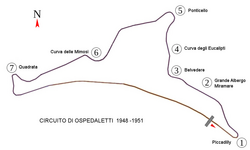| 1950 San Remo Grand Prix | |||
|---|---|---|---|
| Non-championship race in the 1950 Formula One season | |||
 | |||
| Race details | |||
| Date | 16 April 1950 | ||
| Official name | V Gran Premio di San Remo | ||
| Location | San Remo, Liguria, Italy | ||
| Course | Ospedaletti | ||
| Course length | 3.331 km (2.070 miles) | ||
| Distance | 90 laps, 299.790 km (186.281 miles) | ||
| Pole position | |||
| Driver | Ferrari | ||
| Time | 1:52.2 | ||
| Fastest lap | |||
| Driver | | Ferrari | |
| Time | 2:01.2 | ||
| Podium | |||
| First | Alfa Romeo | ||
| Second | Ferrari | ||
| Third | Maserati | ||
The 1950 San Remo Grand Prix was a non-Championship Formula One motor race held on 16 April 1950 at the Autodromo di Ospedaletti, in Sanremo, Liguria, Italy. It was the third race of the 1950 Formula One season. The 90-lap race was won by Alfa Romeo driver Juan Manuel Fangio after starting from second position. Luigi Villoresi finished second in a Ferrari, and Alfredo Pián third in a Maserati.